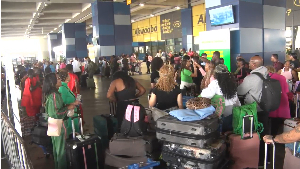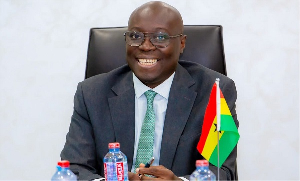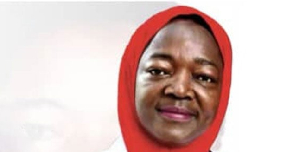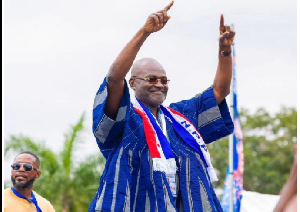Bolgatanga, March 27, GNA - Extreme partisanship and the desire to score political points, lack of transparency and trust, the involvement of party executives and Members of Parliament in the selection and endorsement of District Chief Executives personality conflict and arrogance are some of the causes of tension between DCEs and MPs.
Other sources of tension include the award of contracts and conflict of interest, irregular flow of information and communication, misunderstanding over the accessing and utilization of the MPs' Constituency Development Fund and competition over scarce resources. These were identified at a one-day workshop held in Bolgatanga on Monday for Municipal/District Chief Executives in the Upper East Region. The Ministry of Parliamentary Affairs organized it.
Mr. Felix Owusu-Adjapong, Majority Leader and Minister of Parliamentary Affairs, said even though the MP and the DCE belong to two different arms of government, the efficient functioning of the country's democracy required a complementality of their roles since they were key actors on the governance scene.
"Therefore, a situation of increasing hostility, mutual suspicion and lack of co-operation between the MP and DCE should be a source of concern to all well-meaning Ghanaians because it poses an enormous challenge to our democratic dispensation," he said.
Mr. Owusu-Adjapong said while the role of the DCE as stipulated by the Local Government Act essentially made him/her the chief representative of government responsible for the day-today running of the district, the MP was an elected representative of his/her constituents to the National Legislature and a non-voting member of the District Assembly.
This provision does not only position the MP as a link between the District Assembly and Parliament but also affords him/her the opportunity to understand the problems of the constituents to enable the MP to play his/her advocacy role in Parliament more effectively, the Majority Leader said.
He said the country's quest for an enduring democratic culture, good governance and accelerated development could not be realised if there was no collaboration among DCEs, MPs, Assembly members, traditional rulers, civil servants, civil society organisations as well as several other formal and non-formal actors at the district level. "The various actors must see themselves as different parts of a machine that must necessarily work in tandem with each other to produce the desired result, because the mal-function of a single one of them would ultimately affect the efficiency of the whole system," Mr. Owusu-Adjapong declared.
He said openness, transparency, accountability and the preparedness among DCEs and MPs to cooperate for the general good of the people were essential prerequisites for arriving at a solution to the situation at hand.
Mr. Abraham Dwuma Odoom, the Deputy Minister of Local Government, Rural Development and Environment, said the onset of the decentralisation policy introduced some changes in the country's administrative structures which induced conflict.
What was necessary, therefore, was to devise mechanisms that would minimise or keep those conflicts under control.
Mr. Odoom called for a platform for regular meetings between DCEs and MPs as well as increased interaction among members of the various political camps in the country, saying that the prevailing trend by which people's loyalty to their parties was questioned if they tried to be friendly with persons from an opposing party must be discarded. Professor Joseph Aryee, the Dean of the University of Ghana's Faculty of Social Studies and resource person for the workshop, said the public perception about DCEs having all the money and resources in their districts at their disposal was a major cause of animosity among DCEs, MPs and their supporters at the local level, and suggested that an agreed protocol package be worked out for MPs regardless of their political leanings.
He also cited a scenario in which a losing candidate at the party primaries who later becomes a DCE refuses to co-operate with the MP who beat him in the primaries, and urged the ruling New Patriotic Party (NPP) to soften its stance on the issue of DCEs wishing to contest parliamentary elections.
Professor Aryee said tension between key actors at the district level invariably exacerbated inter and intra-party wrangling. This in turn resulted in the lack of coordination of activities, which eventually impacted negatively on development and poverty reduction efforts.
He urged DCEs to involve MPs in major functions in their districts, and called for humility on the part of all key players. The Regional Minister, Mr. Boniface Gambila, said even though both the DCE and the MP were very close to the people at the grassroots, neither of them could make the desired impact on the lives of the people if they did not collaborate their efforts.
"There is no developmental activity that does not touch on other external sectors, and the responsibility to take the necessary initiative to achieve mutual co-operation lies with those of us in leadership positions," said the Regional Minister. In their contributions, DCEs attributed the conflict between them and the MPs to the reluctance of the latter to abide by laid down procedure in matters relating to the release of funds, procurement and accountability at the district level.
The DCEs said as the final authority in the district, they are called upon to answer audit queries and that if they insisted on the right thing to be done, the MPs misconstrued their actions as non-cooperative and hostile.
They called for a joint platform with MPs so they could deliberate on pertinent issues face-to-face with the view to ironing out their differences.
General News of Tuesday, 27 March 2007
Source: GNA
Relationship Between DCEs and MPs Under Scrutiny
Entertainment











